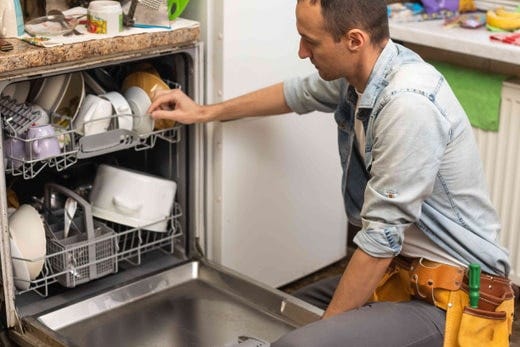
Is Your Dishwasher Not Cleaning Dishes Well?

Dealing with a dishwasher that doesn't clean the dishes well can be frustrating because of all the wasted time, water, and energy, hygiene concerns, and the expectation of a convenient appliance falling short.
Even when you use the best dishwasher detergents and maintain the appliance according to the owner’s manual, you’d expect your dishwasher to perform optimally. But if you are experiencing issues, don’t worry!
We'll equip you with the knowledge and solutions to diagnose and address common issues that cause your dishwasher to not clean the dishes well so you can restore your appliance's dish-cleaning effectiveness and efficiency each time.
Why dishwasher is not cleaning dishes well?
There are a few reasons that could be causing the “dishwasher not cleaning dishes well” issues, such as a dirty dishwasher, incorrect detergent, improper loading, or selecting the wrong program or cycle. Let's look at some of the most common reasons:
1. Check the water inlet valve
While dishwashers are known for their water efficiency compared to handwashing, they still require water to clean dishes effectively.
The water inlet valve regulates water flow into the dishwasher during the wash cycle, impacting cleaning efficiency. A dysfunctional water inlet valve can lead to inadequate water supply and poor dishwashing performance.
To check whether the dishwasher is receiving proper water flow, follow these important steps.
- Place an empty cup on both the top and bottom racks of the dishwasher and run a washing cycle.
- If all the cups are filled with enough water after the cycle, the dishwasher receives sufficient water, which is essential for optimal cleaning performance.
- This simple test helps verify that your dishwasher is operating properly and receiving enough water supply to clean your dishes properly.
2. Check drainage functionality
Pooling water in the bottom of your dishwasher when it's not functioning indicates a drainage issue. If your dishwasher has a filter, scoop it and clear any excess obstructions or debris from the bottom of the dishwasher to ensure maximum performance and proper drainage.
Learn how to clean your dishwasher filter to protect the pump from getting clogged or damaged by food debris, which can lead to compromised drainage functionality.
3. Examining spray arm efficiency
A low spray arm efficiency is another cause for your dishes not to come out as clean as you would've wanted them to. You can examine by rotating the spray arms by hand to achieve smooth movement.
To ensure optimal dishwashing performance and results, remove obstructions that may impede the spray arm's rotating efficiency.
4. Clearing spray arm blockages
Spray arms may become clogged due to hard water deposits or food debris at times. Use a toothpick to meticulously wipe off the holes on the spray arm.
5. Using dishwasher cleaner
Cleaning the dishwasher with a reliable and effective dishwasher cleaner is important to remove built-up grease, limescale, and food residues that can hinder cleaning performance.
Choosing the right dishwasher cleaner helps maintain hygiene, prevents odors, extends appliance life, and ensures dishes come out sparkling clean.
Using Finish Dishwasher Cleaner effectively removes limescale, grease, and other buildup from your dishwasher's internal components, including the spray arms, filters, and pipes.
6. Check with the detergent dispenser
A functional dishwasher detergent compartment ensures proper detergent distribution during the washing cycle. Always check that the detergent dispenser is dry and securely closed, as this allows the proper release of detergent.
Dishwashing detergent should be dissolved for best-performing results. If it's not dissolved properly, take all precautionary measures to avoid the inconvenience.
7. Distribute dishware evenly
Properly distributing your dishware can significantly impact its dishwashing performance by even water flow, thorough cleaning, and preventing blockage over time.
Always ensure the dishes are placed evenly to prevent nesting, as obstructed access may hinder the water spray and the overall cleaning process.
If your dishwasher is still having trouble cleaning dishware effectively, double-check again to ensure it's loaded correctly for the best dish-cleaning results.
8. Using the right dishwasher detergent
Some dishwasher detergents can power through baked-on grime and thwart water spots, while some can barely do the fundamental task of getting everyday dishes clean.
Even with a top-of-the-line dishwasher, proper loading techniques, regular dishwasher maintenance, and precautions, achieving optimal dishwashing outcomes hinges on using an effective dishwasher detergent like Finish.
Always opt for dishwasher detergents recommended by leading dishwasher manufacturers, such as Finish dishwasher detergents, which are available in tablet, liquid, and powder.
These detergents can ensure effective cleaning by breaking down grease, food residue, and stains. They also eliminate odors and leave dishes sparkling clean with every wash cycle.
.png?width=70&height=45&format=png&quality=50)


